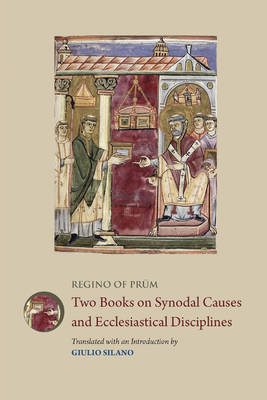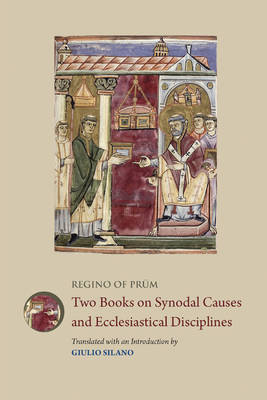
Bedankt voor het vertrouwen het afgelopen jaar! Om jou te bedanken bieden we GRATIS verzending (in België) aan op alles gedurende de hele maand januari.
- Afhalen na 1 uur in een winkel met voorraad
- Gratis thuislevering in België vanaf € 30
- Ruim aanbod met 7 miljoen producten
Bedankt voor het vertrouwen het afgelopen jaar! Om jou te bedanken bieden we GRATIS verzending (in België) aan op alles gedurende de hele maand januari.
- Afhalen na 1 uur in een winkel met voorraad
- Gratis thuislevering in België vanaf € 30
- Ruim aanbod met 7 miljoen producten
Zoeken
Regino of Prum: Two Books on Synodal Causes and Ecclesiastical Disciplines
Regino of Prüm
€ 34,45
+ 68 punten
Omschrijving
Regino of Prum (ca. 840-915), after being deposed as abbot of Prum, became a notable musical theorist, historical chronicler, and student of the canons. His Two Books on Synodal Causes and Ecclesiastical Disciplines have generally been seen as practical handbooks to be used in the decision of synodal cases. Although they may have been used in the course of episcopal visitations, they are not to be read as limited to such use. They are to be regarded primarily as a pedagogical tool, intended to remedy an ignorance of the canonical tradition by the clerics in his part of the world. They are intended to be of use to all who have some position of responsibility within the Church and, ultimately, to every member of the Church. They are meant to help form every Christian, but particularly those clerics who have the responsibility to issue judgments and hear confessions in the Church, and to develop in them a disciplined discernment and a habit of addressing issues as they arise in personal and community life in the light of Scripture and of the long experience of the Church. They are brilliantly arranged around the device of questionnaires which fosters a case-based and tentative approach to the resolution of problems while avoiding abstraction and striving to mitigate legalism. The work was influential in its own region, but obtained much greater resonance through its eventual absorption into the Decretum of Burchard of Worms, thus affecting the whole Western canonical tradition.
Specificaties
Betrokkenen
- Auteur(s):
- Vertaler(s):
- Uitgeverij:
Inhoud
- Aantal bladzijden:
- 374
- Taal:
- Engels
- Reeks:
Eigenschappen
- Productcode (EAN):
- 9780888443106
- Verschijningsdatum:
- 15/11/2021
- Uitvoering:
- Paperback
- Formaat:
- Trade paperback (VS)
- Afmetingen:
- 147 mm x 226 mm
- Gewicht:
- 566 g

Alleen bij Standaard Boekhandel
+ 68 punten op je klantenkaart van Standaard Boekhandel
Beoordelingen
We publiceren alleen reviews die voldoen aan de voorwaarden voor reviews. Bekijk onze voorwaarden voor reviews.









